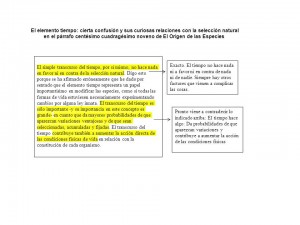![]()
El tiempo y sus curiosas relaciones con la selección natural en el párrafo centésimo cuadragésimo noveno de El Origen de las Especies
Sólo el tiempo no hace nada, dice filosóficamente el autor. Cierto, más ¿Puede alguien ser testigo de un tiempo tan solitario y abandonado tal que no tenga ni quien lo contemple? Sólo el tiempo no hace nada, más su transcurso parece ser de gran importancia ¿Alguien puede imaginar qué sería del tiempo sin su transcurso?
149.
The mere lapse of time by itself does nothing, either for or against natural selection. I state this because it has been erroneously asserted that the element of time has been assumed by me to play an all-important part in modifying species, as if all the forms of life were necessarily undergoing change through some innate law. Lapse of time is only so far important, and its importance in this respect is great, that it gives a better chance of beneficial variations arising and of their being selected, accumulated, and fixed. It likewise tends to increase the direct action of the physical conditions of life, in relation to the constitution of each organism.
El simple transcurso del tiempo, por sí mismo, no hace nada en favor ni en contra de la selección natural. Digo esto porque se ha afirmado erróneamente que he dado por sentado que el elemento tiempo representa un papel importantísimo en modificar las especies, como si todas las formas de vida estuviesen necesariamente experimentando cambios por alguna ley innata. El transcurso del tiempo es sólo importante -y su importancia en este concepto es grande- en cuanto que da mayores probabilidades de que aparezcan variaciones ventajosas y de que sean seleccionadas, acumuladas y fijadas. El transcurso del tiempo contribuye también a aumentar la acción directa de las condiciones físicas de vida en relación con la constitución de cada organismo.

